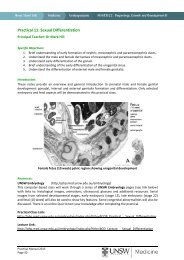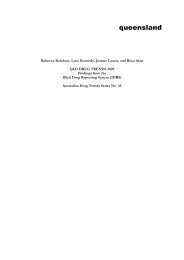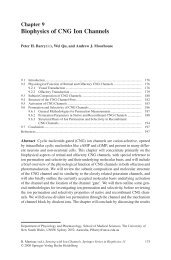Sarah Larney, Bradley Mathers and Kate Dolan Illicit drug treatment ...
Sarah Larney, Bradley Mathers and Kate Dolan Illicit drug treatment ...
Sarah Larney, Bradley Mathers and Kate Dolan Illicit drug treatment ...
- No tags were found...
Create successful ePaper yourself
Turn your PDF publications into a flip-book with our unique Google optimized e-Paper software.
4. THERAPEUTIC COMMUNITIESThe therapeutic community (TC) is a <strong>drug</strong>-free approach to <strong>treatment</strong> in which <strong>drug</strong> oralcohol dependent individuals live in small, highly structured communities (WHO-WPRO, 2006). TCs in the broader community have been shown to be an effective<strong>treatment</strong> option for a subset of clients (see Gowing, Cooke, Biven, & Watts, 2002, for areview of the TC literature).TCs are commonly found in prisons in the United States, from where much of theresearch literature originates. There is a great deal of theoretical <strong>and</strong> non-empiricalliterature on TCs. This review will only consider empirical TC research that employed acomparison group of non-treated <strong>drug</strong> dependent inmates to assess the impact of TC<strong>treatment</strong> on outcomes such as <strong>drug</strong> use <strong>and</strong> criminal recidivism.4.1 Impacts on <strong>drug</strong> useOnly one study that compared <strong>treatment</strong> <strong>and</strong> non-<strong>treatment</strong> groups on <strong>drug</strong> use wasidentified for this review. A study of TC-treated inmates compared with non-treatedinmates found that participation in <strong>treatment</strong> was the strongest predictor of abstinencefrom illicit <strong>drug</strong> use at five-year follow-up. Participants were more than three times morelikely to be <strong>drug</strong>-free than non-participants (Inciardi, Martin, & Butzin, 2004).4.2 Impacts on criminal recidivismMore research has considered the effect of TC <strong>treatment</strong> on criminal recidivismfollowing release from prison. An evaluation of a TC for incarcerated women found thatwhile 30% of women in a non-treated control group were convicted of another offencefollowing release, only 13% of those who completed the <strong>treatment</strong> program werereconvicted. Of those with any exposure to <strong>treatment</strong>, 22% were reconvicted (Mosher &Phillips, 2006).The impact of TC <strong>treatment</strong> on criminal recidivism is maximised when treated inmatestransfer directly to community-based <strong>treatment</strong> on release from prison. For example, attwo-year follow-up, 36% of a group of inmates who underwent prison-based TC16
















